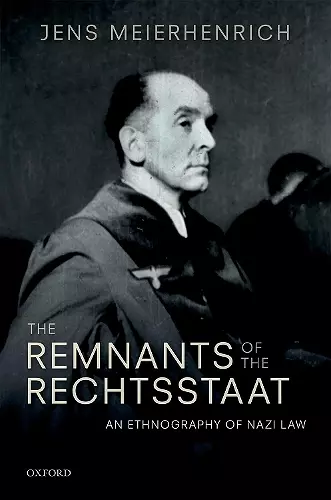The Remnants of the Rechtsstaat
An Ethnography of Nazi Law
Format:Hardback
Publisher:Oxford University Press
Published:1st Mar '18
Currently unavailable, and unfortunately no date known when it will be back

This book is an intellectual history of Ernst Fraenkel's The Dual State (1941, reissued 2017), one of the most erudite books on the theory of dictatorship ever written. Fraenkel's was the first comprehensive analysis of the rise and nature of Nazism, and the only such analysis written from within Hitler's Germany. His sophisticated-not to mention courageous-analysis amounted to an ethnography of Nazi law. As a result of its clandestine origins, The Dual State has been hailed as the ultimate piece of intellectual resistance to the Nazi regime. In this book, Jens Meierhenrich revives Fraenkel's innovative concept of "the dual state," restoring it to its rightful place in the annals of public law scholarship. Blending insights from legal theory and legal history, he tells in an accessible manner the remarkable gestation of Fraenkel's ethnography of law from inside the belly of the behemoth. In addition to questioning the conventional wisdom about the law of the Third Reich, Meierhenrich explores the legal origins of dictatorship elsewhere, then and now. The book sets the parameters for a theory of the "authoritarian rule of law," a cutting edge topic in law and society scholarship with immediate policy implications.
As early as 1938, Ernst Fraenkel, a German labor lawyer and social democrat chased out of Germany because of his Jewish origin attempted an analysis of Nazi law. He argued that law and lawlessness existed side-by-side, and deviously complemented one another. Meierhenrich has carefully and admirably excavated this intellectual achievement, and reimagined Fraenkels dual state for the twenty-first century. This is a terrific book and of immediate relevance for understanding the present: dual states are everywhere. * Michael Stolleis, Professor of Public Law Emeritus, University of Frankfurt, and formerly Director of the Max-Planck-Institute for European Legal History *
The Remnants of the Rechtsstaat is an essential companion to Ernst Fraenkels The Dual State. This work of 1941 set out a valuable analysis of the prerogative state part of the Nazi state. Meierhenrich sets that analysis in its rich context and effectively shows its relevance to an understanding of contemporary authoritarianism. In an era in which the rule of law is increasingly under threat, this book is an immense contribution. * David Dyzenhaus, University Professor of Law and Philosophy, University of Toronto *
One would have hoped that in our own time a rigorous analysis of Nazi law would serve only antiquarian purposes. However, Jens Meierhenrich's magnificent The Remnants of the Rechtsstaat serves as a painful reminder that this is unfortunately not the case. In this brilliant and meticulous reevaluation of Ernst Fraenkel's interrogation of the workings of the Third Reich's legal system, Meierhenrich revives the idea that authoritarian regimes are not in fact lawless entities, but in fact states that deploy legalism in both cynical and systematic ways. In an era when hybrid regimes, which combine both dictatorial and liberal elements, proliferate throughout the world - in Europe and North America, as well The Remnants of the Rechtsstaat is an indispensable read. * John P. McCormick, Professor of Political Science, University of Chicago *
Jens Meierhenrich has written a remarkable book. Working towards a wider account of what remained of rational law under National Socialism, and what might still remain of rational law under conditions of authoritarianism more generally, he has excavated the ways in which the remnants of the Rechtsstaat exist within both regime types. He has done so, moreover, by rehabilitating and furthering a classic idea formulated most famously in Ernst Fraenkels powerful book, The Dual State, about the normative and prerogative dimensions of law and politics under radical duress... Meierhenrichs own ethnography of Nazi law uses Fraenkels example to teach us once again just what was so important about that book and its author, and why political theorists, legal theorists, and historians, as well as scholars of the Third Reich, might profitably return to him anew for lessons that are both deeply historical, but disarmingly contemporary. * Duncan Kelly, Reader in Political Thought, University of Cambridge. *
ISBN: 9780198814412
Dimensions: 224mm x 147mm x 32mm
Weight: 670g
448 pages